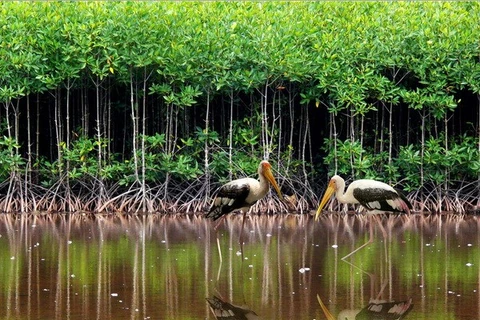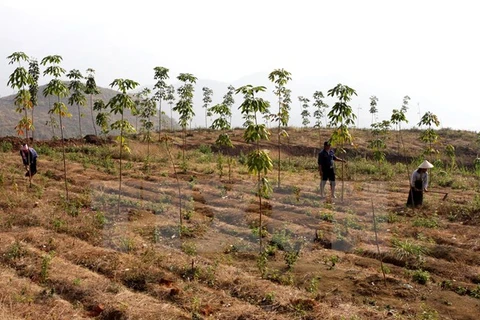Dien Bien (VNA/VNS) - Vang Long Ca of Dien Bien province in northern Vietnam pointed at his pig and explained how he planned to sell it.
“When it weighs less than 100 kilograms, I sell it for 20,000-30,000 VND (0.9-1.3 USD) per kilogram,” he said. “50,000 VND per kilogram when it gets heavier.”
Ca is a resident of Doan Ket village in Muong Nhe district where all the households have joined a project to protect the local forest area.
The payment he gets from patrolling the forest is the only source of additional income for his household, apart from the sale of pigs that often takes him a whole year to raise to 100 kilograms.
A policy of paying residents to patrol the forest has been implemented in the district since 2013, part of a Government plan to improve forest quality and quantity and increase the forest sector’s contribution to the economy.
Some 120 households in Ca’s village were divided into two groups. Ca belongs to Group 1, which is responsible for patrolling some 940ha of forest.
His job is patrolling the forest once or twice each month to detect signs of illegal intrusion and forest product exploitation; each patrol trip lasts three to five days.
At a payment rate of some 500,000 VND per hectare, Ca earns some 4 million VND per year from the job, making the livelihood of his family “somewhat easier”.
Muong Nhe district is the poorest of the 62 poor districts in the country, with a per capita income of some 4 million VND.
The payment that each household receives for environmental services varies in the 10 communes of the district, according to the Muong Nhe Nature Reserve.
“In the communes where there’s a large area of forest to patrol but few households offering the service, a household can earn an average of 7-10 million VND per year,” Diep Van Chinh, deputy director of the reservation area’s management board, said.
Forty-four groups are assigned to patrol some 40,000ha of the reservation, consisting of local residents and staff from the armed forces and border guard stations.
“Before we applied the policy, villagers from around the forest often intruded into the reservation to exploit bamboo shoots, wood and other forest products,” Chinh said.
“The number of illegal wildlife trafficking cases and forest product exploitations has dropped dramatically since we implemented the policy, thanks to the high patrolling frequency of local residents,” he added. Only one case of forest clearance and one case of reservation area intrusion were detected in the first 11 months of this year.
The patrollers are not allowed to exploit forest products in the core areas of the forest and are accompanied on long patrol trips by forest rangers.
The managing board of the reservation hands patrollers passes, which they must present before entering the forest and upon finishing their patrols. Some 1,700 patrol passes have been given out since 2013.
The money to pay patrollers comes from the province’s Forest Protection and Development Fund. Group leaders are in charge of receiving the payment and dividing it to their group members.
“We keep 10 percent of the total payment to support the group’s management team,” said Giang Hu Sinh, leader of Group 2 of Doan Ket village.
“Group leaders, like me, receive the same amount of money as group members, not more,” he added.
During the 2011-15 period, some 306 billion VND (13.5 million USD) were disbursed to the province patrollers.
During a conference on evaluating the policy last October, Lo Van Tien, Vice Chairman of the provincial People’s Committee, said the policy helped local residents stabilise their lives, while acknowledging that the province’s mountainous terrain and underdeveloped transport system made it difficult for patrollers to do their job.
Residents in some distant areas of the province have not been informed of the benefits of providing environmental services, he added. It was hard for authorities to persuade them to take part in the services, partly because the payment rate is different in different areas of the province, he said.-VNA
“When it weighs less than 100 kilograms, I sell it for 20,000-30,000 VND (0.9-1.3 USD) per kilogram,” he said. “50,000 VND per kilogram when it gets heavier.”
Ca is a resident of Doan Ket village in Muong Nhe district where all the households have joined a project to protect the local forest area.
The payment he gets from patrolling the forest is the only source of additional income for his household, apart from the sale of pigs that often takes him a whole year to raise to 100 kilograms.
A policy of paying residents to patrol the forest has been implemented in the district since 2013, part of a Government plan to improve forest quality and quantity and increase the forest sector’s contribution to the economy.
Some 120 households in Ca’s village were divided into two groups. Ca belongs to Group 1, which is responsible for patrolling some 940ha of forest.
His job is patrolling the forest once or twice each month to detect signs of illegal intrusion and forest product exploitation; each patrol trip lasts three to five days.
At a payment rate of some 500,000 VND per hectare, Ca earns some 4 million VND per year from the job, making the livelihood of his family “somewhat easier”.
Muong Nhe district is the poorest of the 62 poor districts in the country, with a per capita income of some 4 million VND.
The payment that each household receives for environmental services varies in the 10 communes of the district, according to the Muong Nhe Nature Reserve.
“In the communes where there’s a large area of forest to patrol but few households offering the service, a household can earn an average of 7-10 million VND per year,” Diep Van Chinh, deputy director of the reservation area’s management board, said.
Forty-four groups are assigned to patrol some 40,000ha of the reservation, consisting of local residents and staff from the armed forces and border guard stations.
“Before we applied the policy, villagers from around the forest often intruded into the reservation to exploit bamboo shoots, wood and other forest products,” Chinh said.
“The number of illegal wildlife trafficking cases and forest product exploitations has dropped dramatically since we implemented the policy, thanks to the high patrolling frequency of local residents,” he added. Only one case of forest clearance and one case of reservation area intrusion were detected in the first 11 months of this year.
The patrollers are not allowed to exploit forest products in the core areas of the forest and are accompanied on long patrol trips by forest rangers.
The managing board of the reservation hands patrollers passes, which they must present before entering the forest and upon finishing their patrols. Some 1,700 patrol passes have been given out since 2013.
The money to pay patrollers comes from the province’s Forest Protection and Development Fund. Group leaders are in charge of receiving the payment and dividing it to their group members.
“We keep 10 percent of the total payment to support the group’s management team,” said Giang Hu Sinh, leader of Group 2 of Doan Ket village.
“Group leaders, like me, receive the same amount of money as group members, not more,” he added.
During the 2011-15 period, some 306 billion VND (13.5 million USD) were disbursed to the province patrollers.
During a conference on evaluating the policy last October, Lo Van Tien, Vice Chairman of the provincial People’s Committee, said the policy helped local residents stabilise their lives, while acknowledging that the province’s mountainous terrain and underdeveloped transport system made it difficult for patrollers to do their job.
Residents in some distant areas of the province have not been informed of the benefits of providing environmental services, he added. It was hard for authorities to persuade them to take part in the services, partly because the payment rate is different in different areas of the province, he said.-VNA
VNA























